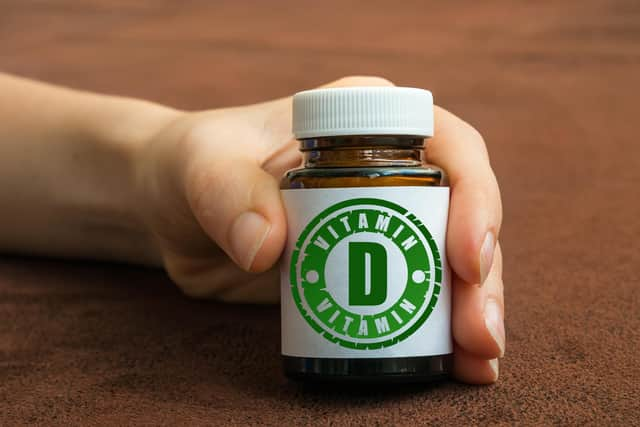Vitamin D and Covid: why boosting your vitamin D levels could help protect against coronavirus - and how to avoid a deficiency
But can it help with symptoms of Covid-19 and how can we avoid a vitamin D deficiency?
Here’s what you need to know.
Why is vitamin D important for our health?


Vitamin D is important for our health because it helps to regulate the amount of calcium and phosphate in the body, which are nutrients needed to keep muscle, teeth and bones healthy.
Advertisement
Hide AdAdvertisement
Hide AdA lack of vitamin D can lead to bone deformities such as rickets in children, and bone pain caused by a condition called osteomalacia in adults.
Where do we get vitamin D from?
From around late March to the end of September, most people should be able to get all the vitamin D they need from sunlight.
The body creates vitamin D from direct sunlight on the skin when outdoors.
However, between October and early March we don't get enough vitamin D from sunlight.
What foods give you vitamin D?
Vitamin D can be found in a small number of foods, including:
oily fish – such as salmon, sardines, herring and mackerel red meat liver egg yolks fortified foods – such as most fat spreads and some breakfast cereals
Can vitamin D help with the symptoms of Covid-19?
Vitamin D is known to help the immune system fight off infections such as colds and flu, but a new study found that low levels of the vitamin have been recorded in a large number of people who tested positive for coronavirus.
However, vitamin D supplements could help Covid-19 patients maintain healthy muscles and bones, while also boosting their immune system.
Advertisement
Hide AdAdvertisement
Hide AdResearchers found that 82 per cent of coronavirus patients, out of the 216 tested at the Marqués de Valdecilla University Hospital in Spain, had a vitamin D deficiency, with men more affected than women.
This was then compared to a control group where 47 per cent of people who didn't have the virus were deficient.
Coronavirus patients with lower vitamin D levels also had raised inflammatory markers, including ferritin and D-dimer.
Inflammatory markers are proteins in our blood, which rise when the body is fighting off an infection.
Co-author of the study, Dr José Hernández of the University of Cantabria in Spain, said: “One approach is to identify and treat vitamin D deficiency, especially in high-risk individuals such as the elderly, patients with comorbidities, and nursing home residents, who are the main target population for the Covid-19.
"Vitamin D treatment should be recommended in Covid-19 patients with low levels of vitamin D circulating in the blood since this approach might have beneficial effects in both the musculoskeletal and the immune system.”
“Vitamin D deficiency has been linked to a variety of health concerns, although research is still underway into why the hormone impacts other systems of the body,” added Dr Hernández.
"Many studies point to the beneficial effect of vitamin D on the immune system, especially regarding protection against infections.”
Advertisement
Hide AdAdvertisement
Hide AdThe research findings were published in the Journal of Clinical Endocrinology & Metabolism.
How much vitamin D do I need?
According to the NHS, babies up to the age of one year need 8.5 to 10 micrograms of vitamin D a day.
Children from the age of one year and adults need 10 micrograms of vitamin D a day, which includes pregnant and breastfeeding women, and people at risk of vitamin D deficiency.
The NHS notes that you should consider taking a daily supplement containing 10 micrograms of vitamin D.
How to avoid vitamin D deficiency
The NHS website explains that there may already be people at risk of vitamin D deficiency, noting, “Some people won't get enough vitamin D from sunlight because they have very little or no sunshine exposure.”
The Department of Health recommends that you take a daily supplement containing 10 micrograms of vitamin D throughout the year if you:
aren't often outdoors – for example, if you're frail or housebound are in an institution like a care home usually wear clothes that cover up most of your skin when outdoors
If you have dark skin – for example you have an African, African-Caribbean or south Asian background – you may not get enough vitamin D from sunlight, so you should also consider taking a daily supplement containing 10 micrograms of vitamin D throughout the year.